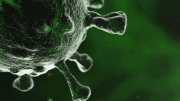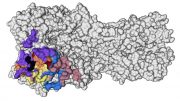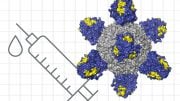
An experimental universal flu vaccine showed strong and lasting results in early-stage clinical trials. It produces antibodies that target a conserved part of the flu virus, potentially providing long-lasting protection with two or three doses.
A vaccine that induces immune responses to a wide spectrum of influenza virus strains and subtypes has produced strong and durable results in early-stage clinical trials in humans, Mount Sinai researchers have found. The universal influenza virus vaccine, which produces antibodies that target the part of the surface protein of the influenza virus known to neutralize diverse influenza strains, was described in a study published today (December 7, 2020) in the journal Nature Medicine. This chimeric hemagglutinin (HA)-based vaccine has the potential to provide long-lived protection with two or three immunizations, eliminating the need for revaccination.
“An influenza virus vaccine that results in broad immunity would likely protect against any emerging influenza virus subtype or strain and would significantly enhance our pandemic preparedness, avoiding future problems with influenza pandemics as we see them now with COVID-19,” says Florian Krammer, PhD, Professor of Microbiology at the Icahn School of Medicine at Mount Sinai, and corresponding author of the study. “Our chimeric hemagglutinin vaccine is a major advance over conventional vaccines which are often mismatched to the circulating strains of virus, impacting their effectiveness. In addition, revaccinating individuals annually is a huge and expensive undertaking.”
Seasonal influenza is a major public health concern, triggering as many as 650,000 deaths every year globally, according to the World Health Organization. In addition, influenza pandemics, similar to the current COVID-19 outbreak, occur at irregular intervals and can claim millions of lives. The most devastating example is the H1N1 pandemic of 1918, which caused approximately 40 million deaths. Influenza virus vaccines — the best preventive weapon in the public health arsenal against seasonal influenza — contain three or four strains of the influenza virus that respond to the viruses circulating in the human population. Their inherent weakness, however, is that vaccine strains in the annual formulations are based on global health surveillance and predictions that are often out of sync with the strains that actually circulate. The situation is compounded in the case of emerging pandemic viruses, since these outbreaks cannot be predicted and emerge suddenly, requiring newly matched vaccines to be generated. This process requires at least six months, leaving large portions of the population vulnerable.
The chimeric HA vaccine seeks to correct this uncertainty by targeting a different part of the hemagglutinin protein, the major surface glycoprotein of the influenza virus that binds to host cell receptors. Conventional vaccines induce neutralizing antibodies that target the distal part of the hemagglutinin, known as the globular head domain. “Unfortunately, the virus is able to escape neutralization by mutating this part of hemagglutinin through a process known as antigenic drift,” explains Peter Palese, PhD, Professor of Microbiology and Chair of the Department of Microbiology at Icahn School of Medicine at Mount Sinai, and co-author of the study. “This genetic change, or shift, in the virus results in immunity to only specific strains of the influenza virus, requiring frequent re-formulation and re-administration of seasonal vaccines. Our chimeric HA vaccine, by contrast, is directed at the proximal part of the HA protein — the stalk domain — which has been shown to broadly neutralize diverse influenza virus strains in both animal models and humans.”
A vaccine construct based on the hemagglutinin stalk domain has been a major focus of the research community. “The beauty part of this vaccine is that it’s not only broad, but multifunctional with stalk-specific antibodies that can neutralize many kinds of influenza viruses,” emphasizes Dr. Adolfo García-Sastre, Director of the Global Health and Emerging Pathogens Institute and Professor of Microbiology at the Icahn School of Medicine at Mount Sinai and also co-author of the study. “This universal vaccine could be particularly beneficial to low and middle income countries that don’t have the resources or the logistics to vaccinate their populations each year against influenza.”
Mount Sinai’s Phase 1 clinical trial evaluated the safety and immunogenicity of the vaccine in 65 participants in the U.S., and was found to produce a strong immune response that endured for at least 18 months following vaccination. “This phase of our clinical work significantly advances our understanding of the immune response in terms of its longevity,” says Dr. Krammer, “and leaves us greatly encouraged about future progress for this potentially breakthrough vaccine.”
Reference: “A chimeric hemagglutinin-based universal influenza virus vaccine approach induces broad and long-lasting immunity in a randomized, placebo-controlled phase I trial” by Raffael Nachbagauer, Jodi Feser, Abdollah Naficy, David I. Bernstein, Jeffrey Guptill, Emmanuel B. Walter, Franceso Berlanda-Scorza, Daniel Stadlbauer, Patrick C. Wilson, Teresa Aydillo, Mohammad Amin Behzadi, Disha Bhavsar, Carly Bliss, Christina Capuano, Juan Manuel Carreño, Veronika Chromikova, Carine Claeys, Lynda Coughlan, Alec W. Freyn, Christopher Gast, Andres Javier, Kaijun Jiang, Chiara Mariottini, Meagan McMahon, Monica McNeal, Alicia Solórzano, Shirin Strohmeier, Weina Sun, Marie Van der Wielen, Bruce L. Innis, Adolfo García-Sastre, Peter Palese and Florian Krammer, 7 December 2020, Nature Medicine.
DOI: 10.1038/s41591-020-1118-7
Collaborative efforts between Mount Sinai, PATH, GSK, the University of Chicago Pritzker School of Medicine, Cincinnati Children’s Hospital Medical Center, and Duke University School of Medicine in North Carolina contributed to the successful testing of this vaccine candidate.
The study was funded in part by the Bill and Melinda Gates Foundation and the NIH. Basic research leading to the design of the vaccine were initially funded by NIAID’s Centers of Excellence for Influenza Research and Surveillance (CEIRS) and analysis of the immune response at later stages was also funded through NIAID’s Collaborative Influenza Vaccine Innovation Centers (CIVIC).









Be the first to comment on "Strong Results for Advanced Universal Flu Vaccine in Clinical Trials"